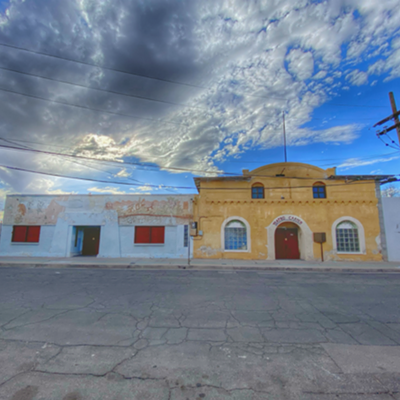There are pauses when Mark Monsivais speaks, as he rummages for words to explain the unexplainable.
Such as the death of his daughter.
There are, of course, happy memories of Julia Monsivais. There's the gifted athlete who won a college softball scholarship, and the hard-driven student who nearly completed her degrees in criminal justice and Spanish before the Border Patrol lured her away. There is the proud agent, upright in her green uniform, only weeks from completing her two-year probation period.
But then there is the Julia Monsivais who, at age 24, died by her own hand. There is also the agency that, despite its much-extolled support system, let this promising young agent down.
"It doesn't take a rocket scientist," says Mark Monsivais, "to see that the Border Patrol failed my daughter."
According to her family, and Border Patrol union officials where she was based in Yuma, Monsivais was mercilessly harassed by her supervisor, Agent Andrea Zortman.
Mark Monsivais puts it another way: "Zortman was what they call a workplace bully. She called my daughter after work and harassed her. ... She nitpicked."
Attempts to contact Agent Zortman for this story were unsuccessful. Nor would the Border Patrol comment on the death of Monsivais.
However, Agent Derek Hernandez is not so silent. Hernandez is the Yuma local president with the National Border Patrol Council, a union representing about 17,000 agents. "It's something that I still don't understand," he says. "You have somebody who reaches out for help, and management are the people they're supposed to turn to."
Hernandez pauses, too, reflecting on the fact that officials knew there were problems between Monsivais and her boss, and still did nothing. The union has requested paperwork surrounding the Monsivais case—proof that she raised the harassment issue with her superiors. "But we've gotten stonewalled here," Hernandez says.
According to Hernandez, after Monsivais died, the agency ignored Zortman's role, and instead demoted another supervisor. "It made me sick how management was dealing with it," he says. "And to this day, they have swept it under the rug."
Similarly, it has taken numerous requests over several weeks for the Tucson Weekly to even obtain agency statistics regarding suicides in its ranks. (See "Agency Angst," Nov. 4, and "Secret Suicides," Oct. 14.) According to information recently provided by the Border Patrol, 15 agents have committed suicide between 2007 and September 2010. That accounts for nearly half of the suicides within Customs and Border Protection, the Border Patrol's parent agency.
Others don't accept the accuracy of those numbers, arguing that image-conscious law-enforcement agencies often categorize self-inflicted deaths as something other than suicide. And while CPB officials characterize the agency's per-capita suicide rate as roughly parallel to the rest of society, others peg it as at least double that of the general public.
Meanwhile, agency officials claim to have bolstered their suicide-prevention efforts under the "Healthier CBP Program."
"In fact, the (CBP) commissioner and deputy commissioner of the agency were very, very involved in sending out messages to the workforce about the problem," says Christine Gaugler, the agency's assistant commissioner for human resources management. Those messages discussed "how (suicide) was affecting CBP employees, and encouraging them to seek help for depression or relationship issues—whatever it was they needed assistance on."
The message also went to supervisors. "From our perspective, the first-line supervisor is the person that is with the employee the most, and can really see differences with anything that might be going on with that individual," Gaugler says. "So we rolled out a supervisory suicide-prevention program. It taught our supervisors to be knowledgeable of the warning signs, and being able to refer employees to mental-health professionals if they needed to."
In the case of Julia Monsivais, Andrea Zortman was that frontline supervisor, says Hernandez. "They're the ones you're supposed to turn to. If you can't turn to them, who do you turn to?"
As a high-ranking employee with the Department of Navy in Corpus Christi, Texas, Mark Monsivais knows a bit about how government works. At first, he says, the Border Patrol seemed a perfect fit for his ambitious daughter. "To be in the Border Patrol, you have to have a Type A personality. She was a stellar athlete and (excelled) in academics. She helped her team go to the national championships. There's nothing better as a father than to turn on the TV and see your daughter on the screen, and see the stats.
"That's the type of person she was," he says. "She was a go-getter. There were a lot of people who really liked her."
Margret and Julia Monsivais were as close as sisters could be, talking by phone two or three times a day. So Margret knew things were turning bad for her sister at the Yuma Station. "One of her superiors, Zortman, Julia had been harassed by her," Margret says.
She says her sister was gay, and wonders if that played a role in the harassment. "It's sad, because Julia was very devoted. She loved the chase—catching the bad guys and putting away the drug-dealers. That's why she wanted to go to the Yuma Station, because that's where the action was."
When she died, Julia Monsivais was one month short of finishing her two-year probation period with the Border Patrol.
It was Friday, July 17, 2009. She was out late with friends when she received a phone call. "Julia stepped outside to listen her voicemail, and came back telling her roommates that 'Zortman did me in,'" says Margret Monsivais. "She said, 'I'm going back to Texas.'"
But Julia Monsivais never made it back. Instead, she went into her bedroom and shot herself with her service weapon. Before she died, her sister received a text message. It read, "Margret, I love you."
In July 2009, Mark Monsivais went to Yuma to retrieve his daughter's body and inspect her records. "I had asked her to document any problems she had with (Zortman), to put a date and time," he says. "But when we went over there, there was nothing. The Border Patrol had already gone through it."
When he asked for the records, he was told he'd have to file a Freedom of Information Act request.
Still, it must be noted that the Border Patrol was preparing to help Julia Monsivais. A meeting with her superiors had been scheduled for July 20, three days after she killed herself.
According to Derek Hernandez, the agency recently prepared to promote Agent Zortman. The Yuma local has opposed that promotion.






